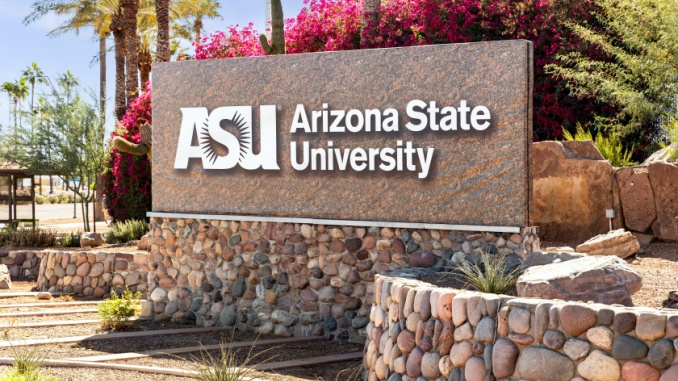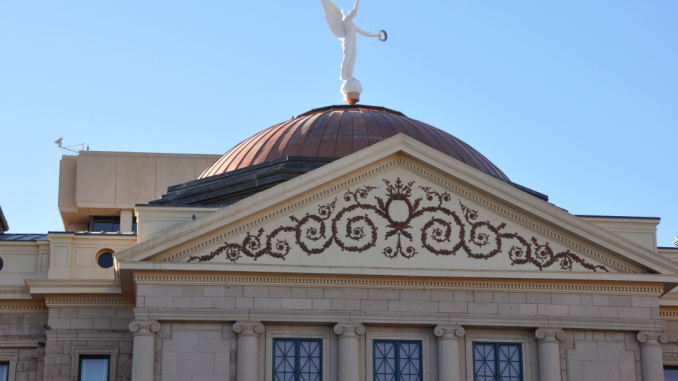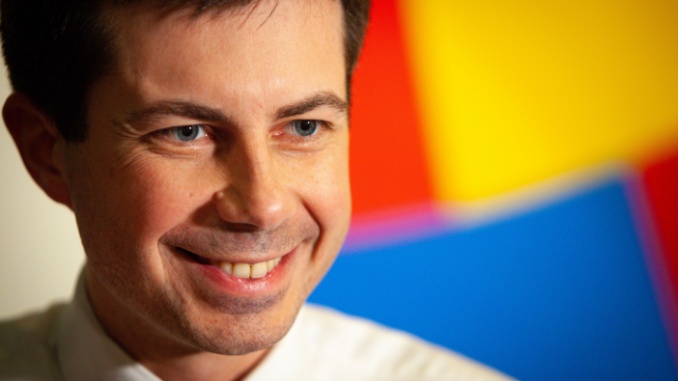
by Ethan Faverino | Sep 10, 2025 | Home Page Top Story, News
By Ethan Faverino |
Arizona Public Service (APS), the state’s largest utility, has submitted a highly questionable new resource plan to the Arizona Corporation Commission, outlining a significant shift in its energy generation strategy through 2028.
The plan, detailed in a recent filing, reveals APS’s intent to disregard President Trump’s opposition to wind power. It will nearly double its generating capacity by adding 7,200 MW of new power, with 93% coming from expensive and unreliable renewable sources—solar, wind, and battery storage—while natural gas accounts for just 7%.
This marks a dramatic pivot toward renewables, with wind power additions matching gas over the next four years and solar outpacing gas by five times over the next three years.
The plan stems from APS’s 2023 “All Source” Request for Proposals (RFP), which initially sought 1,000 MW of new generation, with at least 700 MW from renewables. Surpassing expectations, APS contracted for 7,200 MW, transforming its energy mix.
By 2028, APS’s generation is projected to shift from 76% reliable dispatchable sources (55% natural gas, 14% coal, 8% nuclear) and 19% renewables (10% solar, 6% wind, 3% battery storage) to 46% reliable sources (35% gas, 6% coal, 5% nuclear) and 52% renewables (22% solar, 7% wind, 23% battery storage). This expansion is equivalent to building two new Palo Verde nuclear plants.
This renewable-heavy strategy comes despite recent emphasis by APS and the Commission on a new natural gas pipeline.
The plan has sparked controversy because it contrasts with President Trump’s criticism of wind energy, as APS doubles down on clean energy investments.
Regarding coal, APS’s filing remains vague on the closure of the Four Corners coal plant, projecting an exit between 2031 and 2038. This aligns with APS’s recent shift from “carbon-free” to a “carbon-neutral” goal by 2050.
The revised commitment addresses concerns about affordability and reliability while maintaining a focus on clean energy. Under carbon neutrality, APS must expand generation without increasing emissions, necessitating significant renewable and storage investments.
The Arizona Free Enterprise Club has expressed concerns over the delayed coal phase-out and questioned the cost of the renewable-heavy plan, estimating $42.7 billion over the next 15 years.
APS’s prior claims that renewables paired with storage could match the reliability and affordability of fossil fuels have faced skepticism that the transition may lead to higher rates and grid reliability challenges.
Ethan Faverino is a reporter for AZ Free News. You can send him news tips using this link.

by AZ Free Enterprise Club | Sep 3, 2025 | Opinion
By the Arizona Free Enterprise Club |
If Katie Hobbs is thinking about what to do after her time as Governor is up, one option would be to test her skills in the Hide and Seek World Championships. After all, she proved during the 2022 gubernatorial election campaign that it’s what she’s best at.
After dodging any request to debate her opponent Kari Lake during her campaign, Hobbs also ducked reporters who dared to question her about it. She even hid in a restaurant bathroom after another reporter asked her why she didn’t like discussing politics.
All this hiding should have resulted in a simple decision. According to long-standing Arizona Citizens Clean Elections Commission (AZCCEC) rules, an opponent (in this case Kari Lake) should have been provided with airtime when a candidate (in this case Katie Hobbs) refused to debate. And the AZCCEC planned to do just that. But hours before Kari Lake’s interview was scheduled to take place, the AZCCEC learned that Arizona PBS went behind their back to schedule an exclusive interview with Katie Hobbs—moving them to postpone Lake’s interview.
If you think all this reeks of collusion, you’re right. And now, a public records request has made it clear. Katie Hobbs wasn’t playing hide and seek alone. She was purposefully aided by leadership at Arizona State University (ASU) and at PBS…
>>> CONTINUE READING >>>

by Matthew Holloway | Aug 23, 2025 | Education, News
By Matthew Holloway |
Controversy has once again embroiled Arizona State University (ASU), threatening the credibility of the institution, Arizona PBS, and the Walter Cronkite School of Journalism. Emails uncovered by the Arizona Republic reveal that ASU President Michael Crow, former Arizona Republic publisher Mi-Ai Parrish, and other officials allegedly favored Democratic gubernatorial candidate Katie Hobbs over Republican Kari Lake during the 2022 Arizona gubernatorial election.
Lake has accused them of “collud[ing] to prevent me from having a debate forum.”
Reporting from the Arizona Republic’s Stacey Barchenger earlier this month exposed internal discussions among ASU leadership that appeared to prioritize Hobbs while sidelining Lake. The emails, obtained through public records requests, show that Parrish emailed Arizona PBS leaders, writing, “We may have issues,” after discussions with PBS Senior Director of Content, Ebonye Delaney. They expressed concerns about equal time laws and the risk to ASU’s relationship with the Arizona Citizens Clean Elections Commission.
Crow emailed Parrish, stating, “Whatever the format there remains the fact that it is our venue and brand. We need structure…and format…….and….people who believe in elections as participants.” He later instructed his chief of staff, James O’Brien, and Parrish to “make sure you are both on the same page here,” prompting Parrish to ask, “What outcome are you seeking?”
ASU offered Hobbs a solo interview on Arizona PBS, a move that severed the university’s long-standing partnership with the voter-approved Clean Elections Commission. This decision was influenced by Crow’s reported disagreement with Lake’s views on election integrity and his labeling her an “election denier.”
Barchenger’s report, citing expert opinions, stated “That ASU leaders would consider one candidate’s views, and then reach down and influence television programming, called into question Arizona PBS’ independence as a news organization and its autonomy from university influence, experts said.”
“And it could have risked legal repercussions for Arizona’s largest university, they added.”
The Arizona Republic’s Robert Anglen shared the findings on X, writing, “Newly released emails detail how ASU’s top leaders sought to muzzle Kari Lake in 2022 for her election-denial views and give preferential treatment to Katie Hobbs on Arizona PBS during the governor’s race.”
Lake rejected Arizona PBS’s offer of a 30-minute solo interview, insisting on a joint debate with Hobbs. She told reporters at the time, “If she doesn’t appear with me, they should kick her out. If Democrats don’t have to sit on the debate stage with the Republicans, if they can just stomp their feet and demand a safe space … then we’ll never have a debate system again.” Lake instead participated in a Clean Elections-sponsored interview on another station and vowed to avoid PBS-related events.
In a statement responding to the exposé, Lake said: “Taxpayer-funded Michael Crow and taxpayer-funded ASU, along with taxpayer-funded PBS, colluded to prevent me from having a debate forum for fear I would talk about election fraud, and because their chosen candidate Katie Hobbs would’ve been destroyed in a debate with me. They interfered in the 2022 Arizona Gubernatorial election and trampled on my First Amendment rights. Their actions were not just unethical; they were likely illegal, too.”
ASU spokesman Jay Thorne defended the university’s actions, however, stating, “The shared objective of ASU and Arizona PBS after the gubernatorial debate was cancelled was to provide a forum for the voters of Arizona to hear from the two candidates for Governor in an interview format. It was an opportunity provided under identical conditions to each candidate, and only one accepted the offer.”
The controversy has raised serious questions about Arizona PBS’s journalistic independence and ASU’s impartiality. Crow, who received a contract extension with a pay raise and bonuses in 2024 despite prior scandals, faces renewed scrutiny over allegations of partisan interference in the electoral process. The decision to prioritize one candidate’s platform over another has sparked outrage and could have lasting repercussions for the institutions involved. This rewritten version organizes the information into clear sections, eliminates redundancy, and enhances readability while preserving all original quotes.
The Arizona Free Enterprise Club (AZFEC) announced August 20th that it has filed a Hatch Act complaint against ASU “for using taxpayer-funded resources to meddle in the 2022 Governor’s race.”
Scot Mussi, President of AZFEC, stated, “This was a blatant misuse of taxpayer-funded university resources to tilt the scales of a gubernatorial election. Arizona law is clear: universities must remain impartial and neutral in election-related activities.”
Matthew Holloway is a senior reporter for AZ Free News. Follow him on X for his latest stories, or email tips to Matthew@azfreenews.com.

by AZ Free Enterprise Club | Aug 22, 2025 | Opinion
By the Arizona Free Enterprise Club |
Entering year three of divided government, our expectations for the 2025 legislative session were admittedly not high. With Katie Hobbs occupying the governor’s office and demonstrating that her only skill set is setting new veto records of good public policy, it can be difficult to muster a lot of optimism.
Yet even in politics there is room to be pleasantly surprised and in fact there are several, though likely underappreciated, wins to be celebrated from the first session of the 57th legislature.
Freedom to Move is on the Ballot
After three sessions of introducing a ballot referral to protect every Arizonan’s freedom to move, finally, 2026 voters will have the chance to vote on SCR1004. The timing couldn’t be better as several states are moving forward with the imposition of their own tax per vehicle mile. Most ironically, in Massachusetts lawmakers have introduced legislation which in a masterclass in Double Speak they are calling “The Freedom to Move Act” as well. Every objection The Club has put on the record to VMT targets and taxes is being heralded by the radical liberals in Massachusetts as the benefits to passing the legislation. They proudly claim VMT taxes as a method to achieving their Net Zero goals, forcing people to “choose” other modes of travel like biking and public transit, and though they say there are no “prohibitions” in the bill, they give themselves away when they admit that the state may “facilitate reductions in vehicle miles travelled” in other words driving rations. With the passage of SCR1004, Arizona could be the first state in the country to cut this freedom-crushing policy off at the pass.
Closing the Revolving Door at the Corporation Commission
In an event that was probably rarer than a blue moon or maybe a solar eclipse (whichever is rarer), Governor Hobbs actually signed a bill that The Club supported and advocated for all session long…
>>> CONTINUE READING >>>

by AZ Free Enterprise Club | Aug 11, 2025 | Opinion
By the Arizona Free Enterprise Club |
Seven months into Trump’s return to office, the wreckage of the Biden administration continues to surface—especially in America’s transportation infrastructure. Previously, we highlighted the troubling impact of Pete Buttigieg’s tenure as Secretary of Transportation. His legacy of failure is becoming increasingly clear and public as new coverage reveals how his ideological grant programs, neglect of core responsibilities, and blatant mismanagement have damaged our economy, harmed communities, and sabotaged our personal freedoms.
As covered by the New York Post, Buttigieg, who was charged for four years to oversee the world’s most significant infrastructure network, instead made it his mission to “reimagine” the entire system, framing it as irredeemably racist and in need of dismantling as he famously told Al Sharpton in his “roads are racist” interview. Buttigieg funded his radical agenda through a series of state and local grants. Programs like “Reconnecting Communities” funded the removal of functional highways based on the claim they were originally designed to displace minority neighborhoods, even though those highways are used today by people of all races.
These weren’t transportation programs—they were anti-transportation programs. They prioritized “road diets,” bike lanes, and leveling roads in the name of equity while Americans sat in traffic and airports collapsed under system failures.
The AZ Free Enterprise Club was one of the only organizations sounding the alarm about the ideological hijacking of the USDOT which even despite mainstream knowledge of the corrosive teachings of critical race theory in k-12 education brought to light after COVID, seemed far-fetched to many. We documented how seemingly harmless programs like Vision Zero and the Safe Systems Approach—heavily funded through federal transportation grants—were actually vehicles for social engineering.
Now it is clear how thoroughly he indoctrinated the administration…
>>> CONTINUE READING >>>
Page 1 of 2312345678910...20...»Last »





